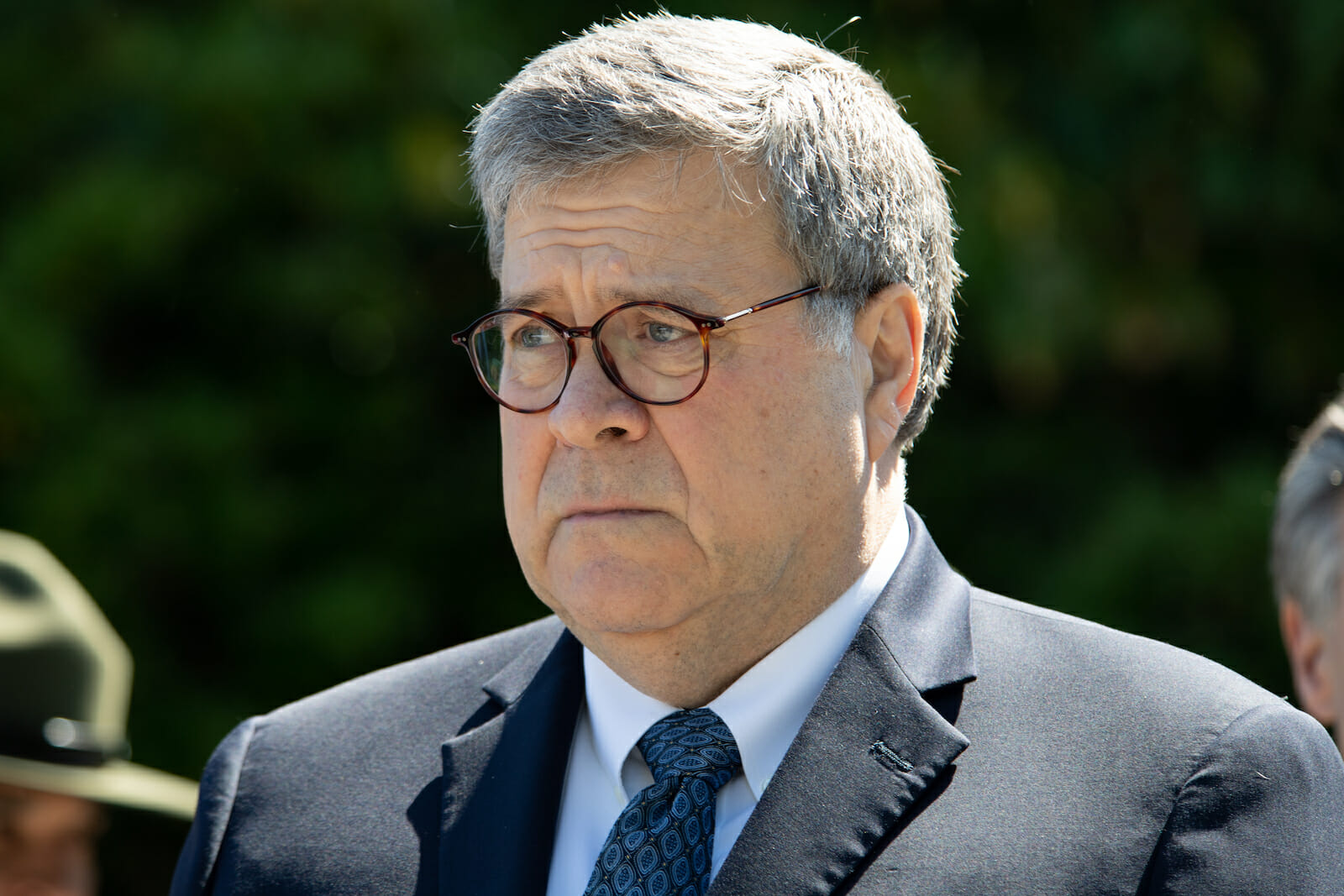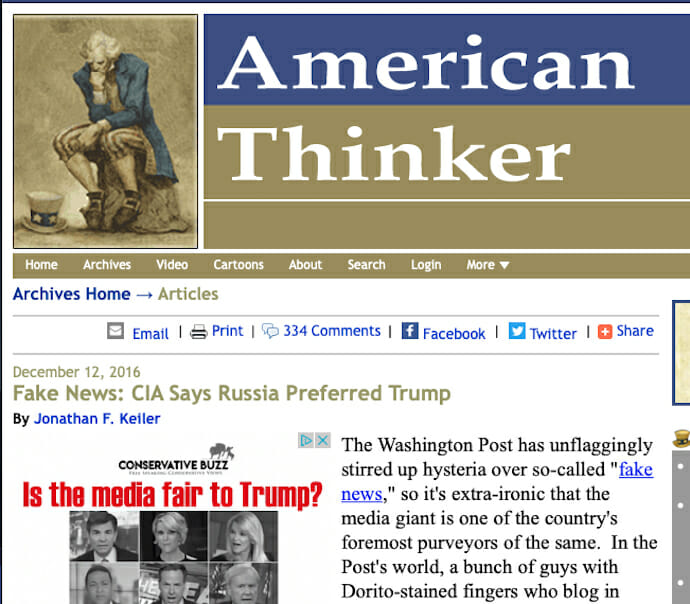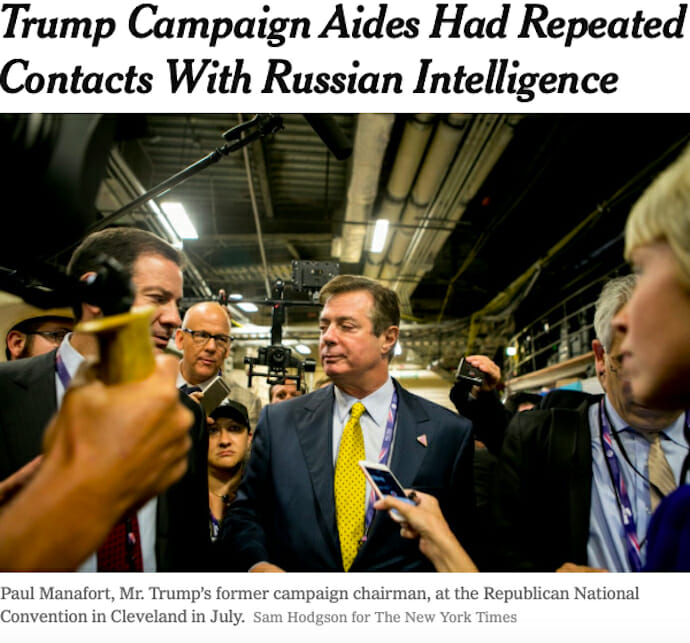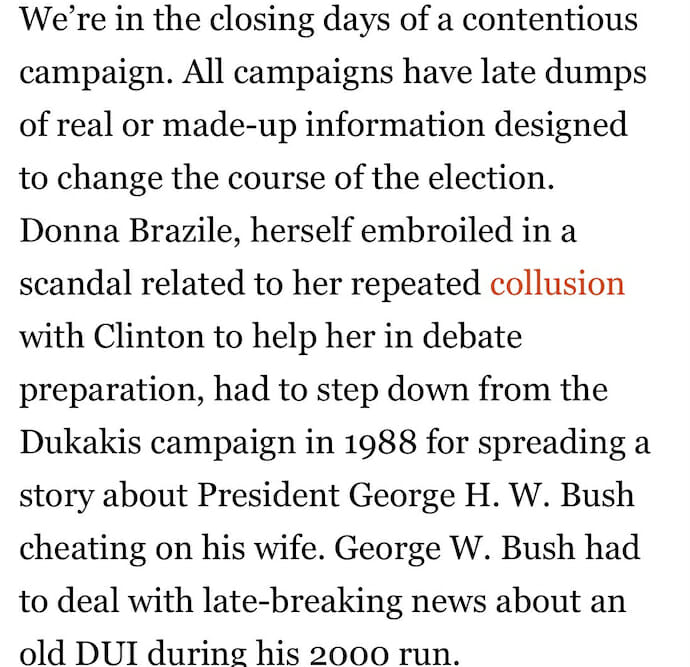
Politics
The No Collusion Hoax
While Democrats and Republicans are deadlocked in a battle with Attorney General William Barr over subpoenas, the Mueller Report’s redacted materials, and virtually everything else, the rest of us should note that the focus has now shifted from the President Trump’s actions to the potential “overreach” of House Democrats as they investigate the administration and consider impeachment. Case in point is The Federalist. They have determined that Congressional oversight of Barr is a “farce” at this point.
This whole thing is such a farce. https://t.co/sR757kT8jM
— David Harsanyi (@davidharsanyi) May 3, 2019
We are now just past week seven since Barr released his original letter, wherein he framed Mueller’s report as an almost total exoneration of the president. Trump himself ran with this framing of the Mueller Report for a few weeks until Mueller’s team started speaking up to the press, and then he ran directly into a brick wall after the report was released (which was quite a bit less than even a partial exoneration). Follow that with Mueller’s extraordinary and scathing rebuke of Barr, in which he said Barr’s summary letter “threaten[ed] to undermine a central purpose for which the [Department of Justice] appointed the Special Counsel: to assure full public confidence in the outcome of the investigations.” Then, fast forward to the present, and Trump’s attorneys are now full-on attacking Mueller and his report. It’s quite a turn from “total exoneration” back to “Mueller is a dirty cop,” but that’s where we’re at.
Most of the Right has argued — against the available evidence — that Barr’s framing of the Mueller Report was fair and accurate. Democrats credibly counter that his ability to read the report and translate its findings before anyone else had access to it allowed for a narrative to form that is only slightly tenured to reality: There was “no collusion” between Trump’s Campaign and the Russians. In turn, the resulting argument is that because there was “no collusion,” the entire second half of Mueller’s report — which outlines the clear crimes of obstruction — isn’t relevant and any attempts to pursue impeachment for that crime is “overreach.” The problem with both of these assertions is that they are false.
***
“Collusion” is a muddy term, and it apparently means something different now than it did in 2016 and 2017. It came into vogue in late 2016, when Clinton’s campaign manager — John Podesta — used it during an interview on “Meet the Press,” where he specifically mentioned the Trump campaign’s knowledge of WikiLeaks’ email drops:
“It’s very much unknown whether there was collusion…What did ‘Trump Inc.’ know, and when did they know it?…Were they in touch with the Russians? I think those are still open questions, and the electors have a right to know what the answers are — if the United States government has those answers — before the election.”
Even in the weeks after this interview, the definition of “collusion” changed. Some pundits used it as a general term to describe the weird contacts between the Russian government and the Trump campaign, but it was used in the context of what was a somewhat controversial idea at the time: The Russians had interfered in the election to help Trump. To be fair, most conservative media outlets pushed back against this notion in order to rebut the broader accusation — believed incorrectly by a slight majority of Democrats in late 2016 — that the Russians altered vote tallies to help Trump win. But they pushed back on it nonetheless.

The collusion accusation took on an entirely different form once the Steele Dossier was published by BuzzFeed in January of 2017. The Steele Dossier charged (literally on its first page) that Trump was essentially a Russian asset being “cultivated” by the Kremlin; that he was presented with real estate deals in Russia in order to “further the Kremlin’s cultivation of him,” that he had been compromised by blackmail, specifically the now infamous “pee tape,” and that the Russians had a dossier on Hillary Clinton.
The entirety of the Steele Dossier was wholly rejected by conservative media at the time, who called it salacious and false. While some conservative pundits like Jonah Goldberg treated it with skepticism and asked for further investigation, others compared it to the Birther Conspiracy long charged against President Barack Obama.
The problem is that at least a few of the charges in the Dossier ended up being true: Trump was indeed involved in a real estate deal in Russia that he denied for years. Steele also found that the Kremlin had been “feeding Trump and his team valuable intelligence on his opponents,” which was also proven by Mueller. With the benefit of hindsight, it’s easy to criticize the skepticism of the Dossier (which contains a lot of false information as well), but conservatives spent much of 2017 and 2018 dismissing every other single instance of “collusion” between Trump’s Campaign and the Russians as rare or medium-rare nothingburgers.
Post-Steele Dossier, we started seeing the term “collusion” getting thrown around after reading stories like this:

Serious question. Have media that love to call political falsehoods such as this “lies” called this a lie? And if not, why not? https://t.co/W48Fj2cPR0
— Mollie (@MZHemingway) February 15, 2017
In June of 2017, the New York Times’ reporting on the Trump Tower meeting emerged, which promptly led to a new explanation in the “NO COLLUSION” narrative: “Collusion is not a crime,” which sort of highlights how different our definitions of “collusion” were in late 2016 and early 2017; by stating “collusion is not a crime,” conservatives were essentially conceding that the meeting amounted to collusion. The argument then switched to: “Trump did not engage in ‘treasonous collusion to affect the outcome of the election,’” which is so specific it slammed the Overton Window shut for all eternity.
Another evolution happened after Trump’s former National Security Adviser, Michael Flynn, was indicted by Mueller in December 2017. At that time, Flynn’s activities were largely dismissed as unrelated to Trump, including full-on skepticism that Flynn was cooperating with Mueller at all in the investigation to target Trump (obviously proven wrong). Byron York suggested at the time that maybe the entire Trump-Russia investigation was about the Logan Act violation potentially committed by Flynn (also wrong).
While it’s slightly unfair to go back and highlight how everyone’s public opinions were wrong about a report that was largely conducted in secret, it’s instructive to look at how far the goalposts have been moved from December 2016 to the present. Mueller’s report ultimately highlights multiple areas of “collusion,” as it were, summarized helpfully by Ryan Goodman, which I’m using as an outline here:
- The Kremlin contacted the Trump campaign and clued them in on their plan to hack and release Hillary Clinton’s emails (page 93 of Mueller’s report).
- The Trump campaign, Paul Manafort, and deputy chairman, Rick Gates, provided internal polling data and information on battleground states with a Russian spy, Konstantin Kilimnik. Manafort worked with Kilimnik on a pro-Russia “peace” plan for Ukraine. Mueller said this went on for months and Manafort assumed that Kilimnik would share the polling data with Russian oligarch Oleg Derispaska, a close ally of Putin (page 138 of Mueller’s report).
- Manafort worked for Trump’s campaign for free, most likely because he believed if Trump won, Derispaska would use him in the United States in other ways.
- Goodman states: “Trump Tower meeting: (1) On receiving an email offering derogatory information on Clinton coming from a Russian government official, Donald Trump Jr. ‘appears to have accepted that offer;’ (2) members of the Campaign discussed the Trump Tower meeting beforehand; (3) Donald Trump Jr. told the Russians during the meeting that Trump could revisit the issue of the Magnitsky Act if elected.”
- On July 27, 2016, Trump publicly asked the Russian government to get a hold of Hillary Clinton’s “missing” 30,000 emails. “Russia if you’re listening,” he said, and a few hours later Russian hackers complied. It was explained by Trump to be a joke at the time, but he privately asked his staff to follow through with his request. Mike Flynn, an advisor to his campaign and future National Security Advisor, contacted Peter Smith (who was also a minor campaign surrogate), as he claimed to have successfully contacted Russian hackers regarding Hillary’s emails.
- The Trump campaign had full knowledge of WikiLeaks’ activities, its coordination with Russia, and when they were timing their drops. Trump himself appears to have had direct knowledge of a drop after taking a phone call (page 54 of Mueller’s report). The Trump campaign planned their public statements around the release of materials from WikiLeaks.
- Donald Trump Jr., was in regular contact with WikiLeaks throughout the campaign and was provided with a password by WikiLeaks to an anti-Trump website (organized by a Super PAC). Trump Jr., used the password and gained access to the website (page 60 of Mueller’s report). He sent an email to the campaign staff: “Guys I got a weird Twitter DM from WikiLeaks. See below. I tried the password and it works and the about section they reference contains the next pie in terms of who is behind it. Not sure if this is anything but it seems like it’s really WikiLeaks asking me as I follow them and it is a DM. Do you know the people mentioned and what the conspiracy they are looking for could be? These are just screenshots but it’s a fully built out page claiming to be a PAC let me know your thoughts and if we want to look into it.”
- The Trump Tower Moscow project — organized by Trump’s personal attorney Michael Cohen — was discussed throughout the 2016 election, with Trump expecting to benefit financially from the deal. The Russian government was fully aware of the project, and much like Trump himself lied to the media about its existence.
- Goodman notes: “During the presidential transition, Jared Kushner and Eric Prince engaged in secret back channel communications with Russian agents. (1) Kushner suggested to the Russian Ambassador that they use a secure communication line from within the Russian Embassy to speak with Russian Generals; and (2) Prince and Kushner’s friend Rick Gerson conducted secret back channel meetings with a Putin agent to develop a plan for U.S.-Russian relations.”
- Goodman finally states: “During the presidential transition, in coordination with other members of the Transition Team, Michael Flynn spoke with the Russian Ambassador to prevent a tit for tat Russian response to the Obama administration’s imposition of sanctions for election interference; the Russians agreed not to retaliate saying they wanted a good relationship with the incoming administration.”
There have always been two competing narratives regarding the Democrats’ definition of “collusion.” Some have used the term to argue that Trump is a Russian agent or asset that is advancing Putin’s interests from the White House. Others such as Adam Schiff, have defined collusion as what we see above: The Trump campaign’s total awareness of the Russian government’s interference in our election and their coordination with those actors.
Mueller was originally tasked with investigating the FBI’s original inquiry into the Russian government’s interference, but also “any links and/or coordination between the Russian government and individuals associated with the campaign of President Donald Trump.” Given the above, it certainly looks like that “coordination” and those “links” were proven by Mueller, even if it did not amount to a “criminal conspiracy.” Moreover, if we look at Podesta’s early definition — did the Trump campaign know about the email hacks? — and Schiff’s definition, it looks there have been at least two public definitions of collusion that Mueller found Trump’s campaign engaged in.
***
In early 2018, just after Flynn’s indictment, Schiff — then ranking member of the House Intelligence Committee — tried to provide a solid definition of collusion:
“But, look, I think when the president says there’s no collusion, what he means is, ‘Bob Mueller has not yet proven beyond a reasonable doubt that I am guilty of the crime of conspiracy.’ Well, that’s a pretty high bar. When people say there’s no collusion, they must have a different word for the kind of corrupt coordination of effort between the Trump campaign and the Russians because when Mike Flynn was secretly talking to the Russian ambassador, and trying to undermine bipartisan sanctions on Russia and lying about it. That was a form of collusion. When the Trump family and campaign manager were meeting in Trump Tower to get dirt on Hillary Clinton as part of what was offered as the Russian government effort to help the campaign, that was a form of collusion. When the president himself and his business are trying to make money from the Russians and get Russian help during the campaign, and promising — or — a new relationship with Russia, and talking about doing away with sanctions, that’s a form of collusion. It’s certainly a form of corrupt combination. But ultimately, it’ll be up to Mueller to determine if that’s a crime.”
But it’s not just Schiff’s definition that was met: Trump himself was one of the people to use the term during the campaign, when he said Hillary Clinton “colluded” with the FBI to, “look less guilty and look a lot better than she looks.” Trump argued that because an Undersecretary at the State Department (where Clinton worked) quibbled about the classified status of an email with an FBI official, that amounted to “collusion” (the whole affair is debunked here). If a mere conversation between a State Department official and the FBI met Trump’s definition of “collusion,” then surely Trump’s repeated contacts with the Russians meets that definition?

To use another example, Mollie Hemingway said in October 2016 that Donna Brazile passing debate info to Hillary amounted to “collusion,” but now says on an almost daily basis that no collusion occurred. If the passing of debate questions to Clinton counts as collusion, then maybe the dissemination of emails and the heads up from WikiLeaks also counts? Or maybe the definition of collusion will change again.
Mueller himself outlined in his report that collusion is not defined in the criminal code. In fact, Mueller says the same thing about coordination, the very thing he was directed to investigate. Instead, Mueller applied the standards for “conspiracy,” and ultimately determined that while the campaign was aware of the Russian government’s attacks and “expected to benefit” from those attacks, there was no “meeting of the minds” done beforehand to agree upon a mutual goal.
The “meeting of the minds” is of important legal relevance because it is the sine qua non of a conspiracy charge. Mueller basically lays out through his document that while there was collusion, it was ultimately too clumsy and uncoordinated to meet the statutory definition of a crime. He actually makes this point clear to the expert in his report, but a layperson might miss it.
Mueller investigated two crimes in his report: The dissemination of hacked emails (what Podesta originally referenced in December 2016) and a social media campaign conducted by the Russians to disrupt the election. While Mueller points out that the Trump campaign unwittingly participated in the social media campaign with various Russians, he makes clear that he found “no evidence” that the Trump campaign was aware that they were doing so. Contrast that with Mueller’s statement about the dissemination of hacked emails: He stated that the evidence he found “did not establish” that Trump’s campaign could be charged with a crime, but he never says that there was no evidence of collusion; he clearly states that he did find evidence.
***
If you are a layperson who thinks of collusion as a “secret or illegal cooperation or conspiracy, especially in order to cheat or deceive others,” it appears that Trump’s activities literally meet the Dictionary’s definition: Trump’s contacts with the Russians were secret; they were cooperative; and they were done in order to cheat or deceive others.
The fundamental problem with Trump that the GOP has either failed to realize or continues to ignore is that his mercurial relationship with reality and the truth has residual effects on his supporters. The reason that the GOP had to move the goalposts from, “There were no Russian contacts,” to, “Contacts with the Russian Ambassador are normal,” to, “Collusion is not a crime,” to, “This was not treasonous collusion to steal the election,” to “There is nothing wrong with taking information from Russians,” is the same reason they have had to go from praising Mueller to now calling him a dirty cop: It is simply impossible to keep up with Trump’s lies.
Justin Amash made headlines this past weekend (and on Monday) as the first Republican Congressman to call for Trump’s impeachment. He did so after reading the Mueller report in its entirety, which makes clear that Trump’s campaign was engaging activity that he reasonably assumed was illegal and that he sought to cover it up by stopping the investigation. It is a clear and valid case of obstruction of justice, and that crime becomes even more clear when you recognize the very thing Trump was trying to cover up: Trump’s and his campaign colluded with the Russian government.

